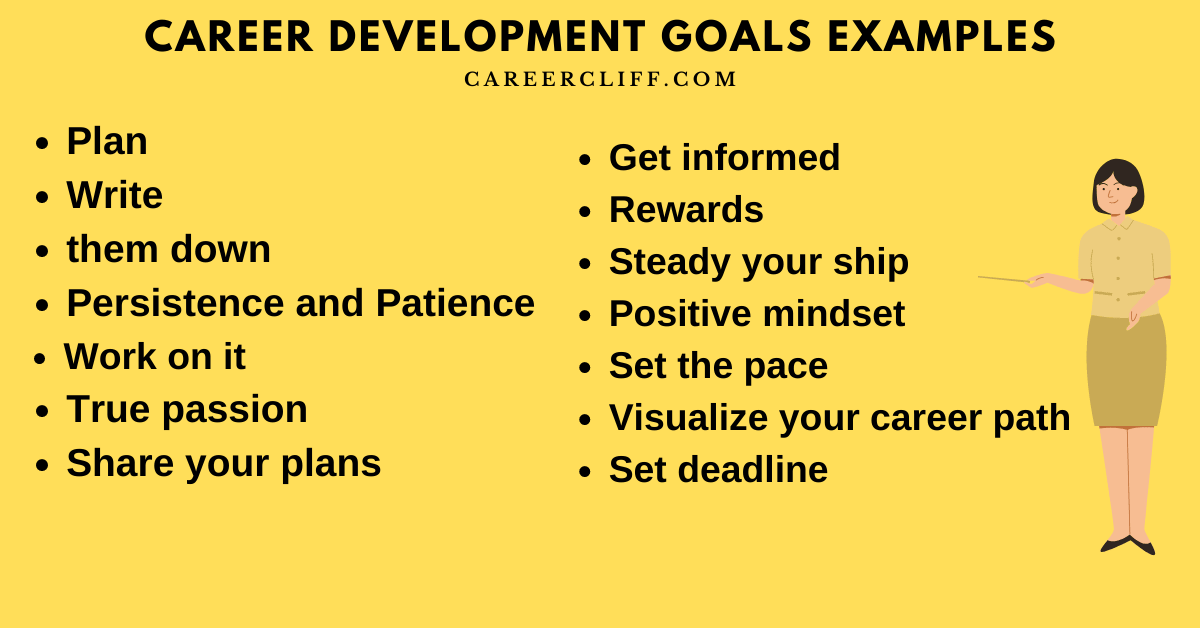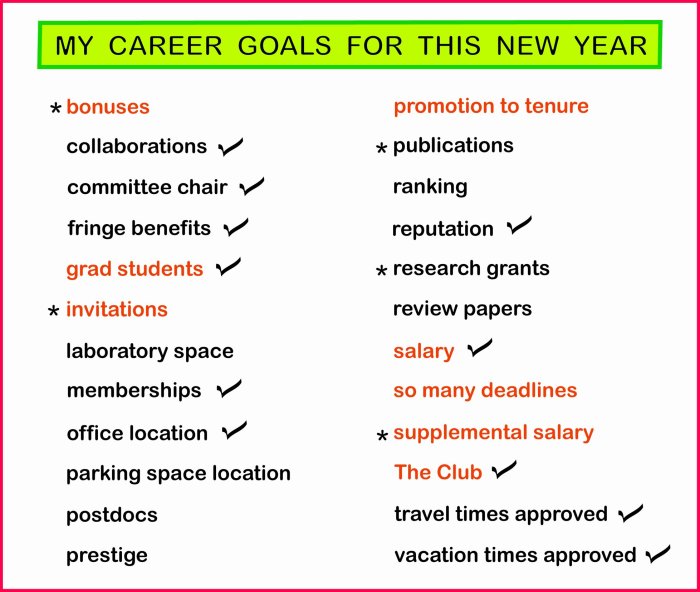Career Development Goals are the key to unlocking your professional potential, guiding you towards success in the competitive world of work. From setting clear objectives to tracking progress, this journey is filled with opportunities for growth and fulfillment.
Importance of Career Development Goals
Setting career development goals is crucial for professional growth as it provides individuals with a roadmap to success. By clearly defining their objectives, individuals can focus their efforts and resources towards achieving milestones in their careers.
Benefits of Clear Career Objectives
- Increased Clarity: Having clear career development goals helps individuals identify their strengths, weaknesses, and areas for improvement.
- Enhanced Motivation: Setting goals gives individuals a sense of purpose and direction, motivating them to work towards their aspirations.
- Professional Growth: Career development goals push individuals out of their comfort zones, encouraging them to acquire new skills and experiences.
- Improved Decision Making: Clear objectives help individuals make informed decisions about their career paths, leading to better outcomes.
How Career Development Goals Lead to Job Satisfaction and Motivation
- Goal Achievement: Accomplishing career development goals gives individuals a sense of accomplishment and satisfaction, boosting their morale.
- Increased Confidence: Meeting set objectives builds confidence and self-belief, leading to a positive outlook on future career prospects.
- Alignment with Values: Pursuing meaningful career goals that align with personal values enhances job satisfaction and overall happiness.
- Continuous Improvement: Setting and achieving career development goals fosters a culture of continuous learning and growth, driving motivation.
Types of Career Development Goals

In the journey of career development, individuals often set different types of goals to guide their progress and growth. These goals can be categorized into skill-based, position-based, or education-based goals, each serving a specific purpose in advancing one’s career.
Skill-Based Career Goals
Skill-based career goals focus on acquiring or enhancing specific skills that are essential for success in a particular field or industry. These goals may include improving communication skills, mastering new technologies, or developing leadership abilities to excel in a chosen profession.
Position-Based Career Goals
Position-based career goals are centered around advancing to a higher role or position within an organization. These goals often involve gaining relevant experience, taking on leadership responsibilities, or pursuing promotions to climb the corporate ladder and achieve career progression.
Education-Based Career Goals
Education-based career goals revolve around furthering one’s education and qualifications to enhance career prospects. These goals may include obtaining advanced degrees, certifications, or specialized training to stay competitive in the job market and open up new opportunities for career growth.
Short-Term vs. Long-Term Career Goals
Short-term career goals typically focus on immediate objectives that can be achieved within a shorter time frame, such as gaining a new skill or completing a project. On the other hand, long-term career goals are strategic objectives that require long-term planning and effort, such as reaching a senior leadership position or starting a successful business.
Importance of Setting SMART Goals
Setting SMART (Specific, Measurable, Achievable, Relevant, Time-bound) goals is crucial for effective career development. SMART goals provide clarity, focus, and motivation, guiding individuals towards actionable steps and measurable outcomes. By setting SMART goals, individuals can track their progress, stay accountable, and make informed decisions to achieve their career aspirations.
Creating Effective Career Development Goals

When it comes to setting career development goals, it’s crucial to align them with your personal values and interests. By doing so, you’ll be more motivated to work towards achieving them and find fulfillment in your career.
Aligning Career Goals with Personal Values and Interests, Career Development Goals
To align your career goals with your personal values and interests, take some time to reflect on what truly matters to you. Consider what activities make you feel most fulfilled and what values are important to you. Once you have a clear understanding of your values and interests, you can begin to set goals that align with them.
- Reflect on your passions and interests to identify potential career paths that align with them.
- Consider how your values can be integrated into your career goals to ensure they are meaningful to you.
- Regularly review your goals to ensure they still align with your values and interests as they may evolve over time.
Evaluating Current Skills and Identifying Areas for Improvement
When setting career goals, it’s important to evaluate your current skills and identify areas where you can improve to reach your goals. This self-assessment will help you understand what steps you need to take to develop the necessary skills for your desired career path.
- Conduct a skills assessment to identify your strengths and weaknesses.
- Seek feedback from mentors or colleagues to gain a better understanding of your skills and areas for improvement.
- Develop a plan to enhance your skills through training, courses, or on-the-job experience.
Breaking Down Long-Term Goals into Achievable Milestones
Setting long-term career goals can be overwhelming, so it’s essential to break them down into smaller, achievable milestones. This approach will help you stay motivated and track your progress towards your ultimate career objectives.
- Divide your long-term goals into smaller, actionable tasks or milestones.
- Set deadlines for each milestone to keep yourself accountable and on track.
- Celebrate your achievements as you reach each milestone to stay motivated and focused on your long-term goals.
Tracking and Achieving Career Development Goals
Regularly reviewing and adjusting career goals is crucial for staying on the right path towards success. As we gain new experiences, skills, and insights, our career aspirations may evolve, requiring us to adapt our goals accordingly. By regularly assessing our progress and making necessary adjustments, we can ensure that we are always working towards our desired outcomes.
Tools and Methods for Tracking Progress
- Utilizing a career journal or planner to document goals, action steps, and achievements.
- Setting up regular check-ins with a mentor or career coach to discuss progress and receive feedback.
- Using project management tools or apps to track tasks, deadlines, and milestones related to career goals.
- Creating visual representations, such as vision boards or goal charts, to stay motivated and focused on objectives.
Success Stories of Achieving Career Development Goals
“Success is not final, failure is not fatal: It is the courage to continue that counts.” – Winston Churchill
- Emily, a graphic designer, achieved her goal of becoming a creative director by consistently taking on challenging projects, seeking feedback, and networking within the industry.
- Carlos, a software engineer, reached his goal of starting his own tech company by attending coding bootcamps, building a strong portfolio, and pitching his ideas to investors.
- Maya, a marketing manager, advanced to the role of VP of Marketing by pursuing additional certifications, leading successful campaigns, and fostering strong relationships with clients and colleagues.
